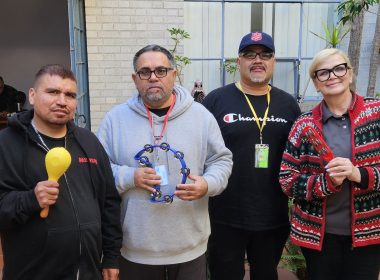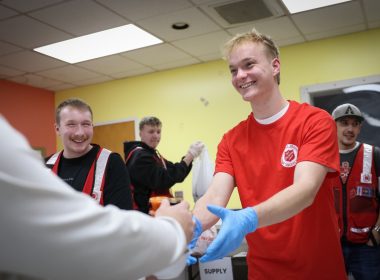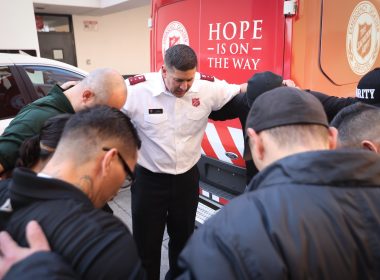Navigating icy floodwaters and slogging through sewage-filled steams, Salvation Army officers and volunteers evacuated flood victims and provided relief to thousands in Washington and Oregon.
With the Portland, Salem, and North Coast regions bearing the brunt of the rapidly-rising waters, scores of Army relief workers worked round-the-clock feeding and housing victims and emergency personnel.
“We prepared 1,200 meals at Salem Citadel on Wednesday,” said regional coordinator Captain Gene Ragan, “and are actively serving victims, police officers and the National Guard.” Up to 200 a night were sheltered at the corps. Seven mobile vans provided 24-hour feeding, and will continue services during clean-up efforts. While floods and mudslides wrought havoc, The Salvation Army quickly moved in to meet immediate needs: 500 inmates from the Oregon State Institute of Corrections were evacuated and housed at the Army’s Camp Kuratli; downtown Portland’s Harbor Light Center was evacuated, with families and individuals housed at the Portland Tabernacle shelter at Divisional Headquarters; other corps and outposts in Salem, Dallas, McMinnville, Moore Street, Le Grande, Silverton, and Tillamook County, Ore., and Walla Walla, Wash., fed and sheltered victims and relief workers.
In Tillamook County, where The Salvation Army established three shelters, an Army relief team worked with the Coast Guard to evacuate victims, transporting them by boat to the shelters.
In a situation called the worst flooding in the state of Oregon in almost 30 years, the Army was on site from the start, as Cascade Division Disaster Services Coordinator Envoy Jim Horgan, and Envoy Cathy Basso, Dallas Corps, distributed coffee and doughnuts to workers who were directing traffic and assessing flood conditions in Grand Ronde and Valley Junction. Basso later served over 200 workers and people waiting in their cars to be escorted through water in those areas.
Envoy Florence Robb assisted in relief operations at Silverton, where the Red Cross sheltered victims at the community building, with the Army providing food and other necessities, including blankets and diapers.
In Walla Walla, more than 220 evacuees were given food, coats, blankets and toiletries, and in Dayton, children were provided milk as supplies were cut off by flood waters.
In addition to response teams on site, Major Richard Love, Cascade divisional commander, directed all Salvation Army centers in the division to be on stand-by for dispatch as needed.
Funds for relief work are urgently needed. Monetary donations earmarked “Flood Relief” may be sent to local Salvation Army units.










